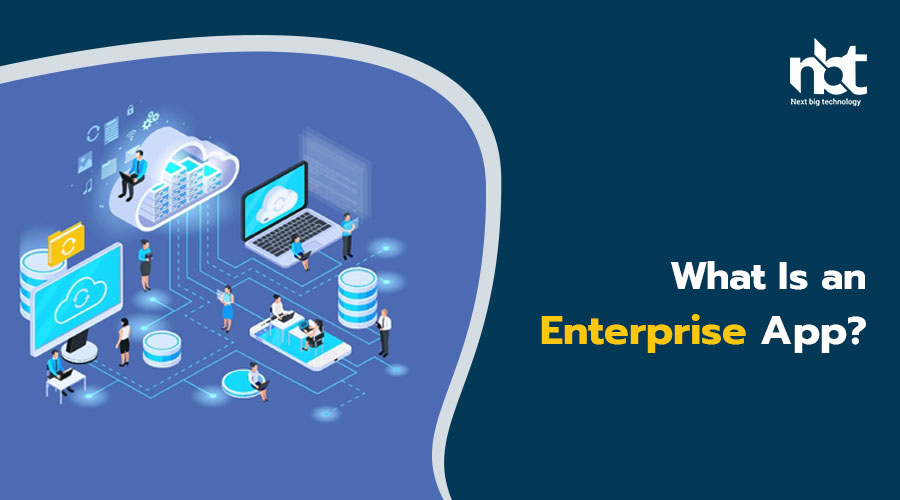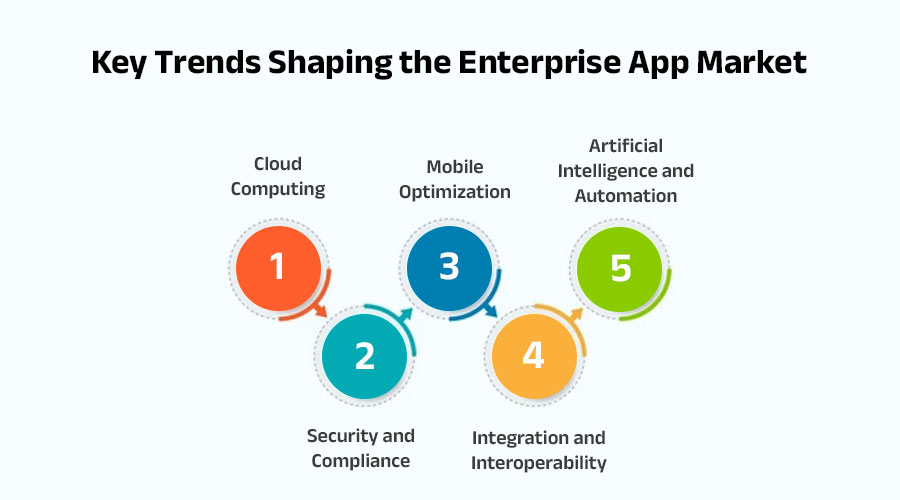Table of Contents
Definition of Enterprise App
In the dynamic realm of technology, where innovations are incessant and advancements are rapid, the terminology surrounding various applications can often be bewildering. Among these, “enterprise apps” stands as a pivotal concept, commanding attention due to its significance in modern business landscapes. So, let’s embark on a journey to unravel the essence of enterprise apps, delving into their definition, functionalities, and importance in contemporary enterprises.
Defining Enterprise Apps:
At its core, an enterprise app, short for enterprise application, refers to a software solution specifically designed to cater to the intricate needs of organizations and businesses. These applications are tailored to streamline, optimize, and automate various processes within a corporate environment. Unlike consumer-oriented apps, which target individual users, enterprise apps are engineered to enhance efficiency, productivity, and collaboration across departments and teams within an enterprise.
Functionalities of Enterprise Apps:
Enterprise apps encompass a diverse array of functionalities, each meticulously crafted to address specific operational requirements of businesses. These functionalities may include:
- Resource Planning: Enterprise resource planning (ERP) systems form the backbone of many enterprise apps, facilitating seamless integration and management of core business processes such as finance, human resources, inventory, and supply chain management.
- Customer Relationship Management: CRM software empowers businesses to nurture customer relationships, optimize sales processes, and enhance customer satisfaction through effective management of customer interactions and data.
- Collaboration and Communication: Enterprise collaboration tools promote teamwork and communication by providing platforms for real-time messaging, file sharing, project management, and collaborative document editing.
- Business Intelligence and Analytics: Enterprise apps often incorporate robust analytics capabilities, enabling organizations to gain valuable insights from vast volumes of data, thus facilitating informed decision-making and strategic planning.
- Workflow Automation: Automation features within enterprise apps streamline repetitive tasks, reduce manual intervention, and enhance operational efficiency by orchestrating workflows and business processes.
Importance of Enterprise Apps:
In the contemporary business landscape, characterized by rapid digital transformation and evolving consumer demands, the significance of enterprise apps cannot be overstated. Here’s why these applications are indispensable for modern enterprises:
- Enhanced Efficiency: By automating mundane tasks and optimizing workflows, enterprise apps enable organizations to operate more efficiently, thereby saving time and resources.
- Improved Collaboration: With features tailored for seamless communication and collaboration, enterprise apps foster teamwork and knowledge sharing among employees, irrespective of geographical barriers.
- Strategic Decision-Making: Through advanced analytics and reporting capabilities, enterprise apps empower decision-makers to derive actionable insights from data, facilitating strategic decision-making and driving business growth.
- Scalability and Flexibility: Enterprise apps are designed to scale alongside the growth of an organization, accommodating evolving needs and expanding operations without compromising performance or stability.
- Competitive Advantage: By leveraging the capabilities of enterprise apps, businesses can gain a competitive edge in the market by delivering superior products and services, enhancing customer experiences, and adapting swiftly to changing market dynamics.
Key Characteristics of Enterprise Applications
In the ever-evolving landscape of technology, enterprise applications stand out as vital tools for businesses aiming to streamline their operations, enhance productivity, and stay ahead of the competition. These applications, often referred to as enterprise software or enterprise-level software, cater to the complex needs of organizations, offering a range of functionalities tailored to meet specific business requirements. Let’s delve into the key characteristics that define these crucial tools.
- Scalability: One of the foremost characteristics of enterprise applications is their scalability. Businesses, whether small startups or large corporations, require software solutions that can adapt to their changing needs. Enterprise applications are designed to accommodate growth, seamlessly handling increased data loads, user traffic, and expanding functionalities without compromising performance.
- Flexibility and Customization: Every business operates differently, with unique processes, workflows, and preferences. Enterprise applications recognize this diversity and offer flexibility and customization options. From configurable dashboards to modular features, these applications empower businesses to tailor the software to their specific requirements, ensuring optimal efficiency and user satisfaction.
- Integration Capabilities: In today’s interconnected digital ecosystem, seamless integration with existing systems and third-party applications is essential. Enterprise applications excel in their ability to integrate with a variety of platforms, databases, APIs, and services, facilitating data exchange and interoperability across the organization. This integration streamlines processes, reduces duplication of effort, and enhances overall productivity.
- Security and Compliance: With cyber threats on the rise and data privacy regulations becoming increasingly stringent, security is a top priority for businesses deploying enterprise applications. These software solutions implement robust security measures, including data encryption, access controls, authentication mechanisms, and regular updates to mitigate vulnerabilities. Moreover, they adhere to industry-specific compliance standards, such as GDPR, HIPAA, or SOC 2, ensuring the protection of sensitive information and regulatory compliance.
- Performance and Reliability: Unwavering performance and reliability are non-negotiable when it comes to enterprise applications. Businesses rely on these software solutions to carry out mission-critical tasks and operations seamlessly. Enterprise applications are engineered for high performance, with optimized code, efficient algorithms, and scalable architectures to deliver consistent performance under varying workloads. Additionally, they undergo rigorous testing and quality assurance processes to ensure reliability and minimize downtime.
- Analytical Capabilities: Data-driven decision-making is integral to modern business strategies, and enterprise applications play a pivotal role in this regard. These software solutions offer advanced analytics and reporting features, empowering organizations to gain actionable insights from their data. Whether it’s generating comprehensive reports, conducting predictive analysis, or visualizing key metrics through interactive dashboards, enterprise applications enable businesses to make informed decisions and drive growth.
- User Experience (UX): Last but not least, a seamless and intuitive user experience is essential for driving user adoption and maximizing the effectiveness of enterprise applications. These software solutions prioritize UX design, employing principles of usability, accessibility, and responsiveness to create intuitive interfaces that enhance user satisfaction and productivity. Through user-centric design methodologies and iterative refinement, enterprise applications ensure that users can efficiently navigate the software and accomplish tasks with minimal friction.
Importance of Enterprise Apps in Business
In the ever-evolving landscape of business operations, enterprises are constantly seeking avenues to enhance efficiency, productivity, and competitiveness. Amidst this quest, the role of enterprise applications has emerged as a pivotal force driving transformative change. From streamlining processes to fostering innovation, these sophisticated software solutions have become indispensable assets for businesses across diverse industries. Let’s delve into the profound importance of enterprise apps in empowering modern enterprises.
Enhancing Operational Efficiency: Enterprise applications serve as the cornerstone for optimizing various business operations. Whether it’s managing resources, automating repetitive tasks, or facilitating seamless communication, these apps enable organizations to streamline their workflows with unparalleled efficiency. By integrating disparate systems and processes into a unified platform, businesses can eliminate redundancies, minimize errors, and accelerate decision-making processes.
Empowering Data-Driven Insights: In today’s data-driven era, access to timely and actionable insights is crucial for informed decision-making. Enterprise apps leverage advanced analytics and reporting capabilities to provide stakeholders with real-time visibility into key performance metrics, market trends, and customer behavior. By harnessing the power of data analytics, businesses can gain valuable insights that drive strategic initiatives, identify growth opportunities, and mitigate risks effectively.
Facilitating Collaboration and Communication: Effective communication and collaboration are vital components of organizational success. Enterprise apps offer robust collaboration tools, such as project management suites, document sharing platforms, and virtual meeting solutions, that enable teams to collaborate seamlessly regardless of geographical barriers. By fostering a culture of collaboration, these apps facilitate knowledge sharing, enhance teamwork, and boost productivity across the enterprise.
Driving Innovation and Agility: In today’s fast-paced business environment, agility and innovation are key differentiators that separate market leaders from laggards. Enterprise apps empower businesses to adapt swiftly to changing market dynamics, customer preferences, and industry trends. Whether it’s experimenting with new business models, launching innovative products, or scaling operations rapidly, these apps provide the agility and flexibility needed to stay ahead of the curve.
Ensuring Scalability and Flexibility: As businesses expand and evolve, scalability and flexibility become critical considerations. Enterprise apps offer scalable architecture and modular designs that can accommodate the evolving needs of growing enterprises. Whether it’s scaling up to meet increased demand or customizing workflows to suit specific requirements, these apps provide the flexibility needed to adapt to changing business dynamics without compromising performance or reliability.
Improving Customer Experience: In today’s hyper-competitive marketplace, delivering exceptional customer experiences is non-negotiable. Enterprise apps play a pivotal role in enhancing customer satisfaction by enabling personalized interactions, seamless transactions, and proactive support services. By leveraging customer relationship management (CRM) platforms, omnichannel marketing tools, and self-service portals, businesses can cultivate long-lasting relationships with their customers and drive loyalty.
Types of Enterprise Applications
In today’s digital age, enterprise applications have become the backbone of businesses, enabling them to streamline operations, enhance productivity, and stay competitive in the market. These applications cater to various aspects of organizational functions, each serving a specific purpose. Let’s delve into the diverse types of enterprise applications that empower businesses across different sectors.
- Enterprise Resource Planning (ERP) Systems: ERP systems integrate core business processes such as finance, human resources, supply chain management, and manufacturing into a unified platform. They provide real-time insights, streamline workflows, and facilitate data-driven decision-making, thereby optimizing operational efficiency and resource utilization.
- Customer Relationship Management (CRM) Software: CRM software helps businesses manage interactions with existing and potential customers. It tracks customer interactions across multiple channels, automates sales processes, and analyzes customer data to improve engagement and retention. CRM systems foster personalized customer experiences and drive sales growth through targeted marketing campaigns.
- Supply Chain Management (SCM) Solutions: SCM solutions optimize the flow of goods and services from raw material procurement to product delivery. They facilitate end-to-end visibility into supply chain processes, inventory management, demand forecasting, and logistics coordination. By minimizing disruptions and reducing costs, SCM solutions enhance supply chain resilience and foster collaboration with suppliers and partners.
- Enterprise Content Management (ECM) Systems: ECM systems manage the creation, storage, distribution, and retrieval of digital content within an organization. They ensure centralized control over documents, images, videos, and other unstructured data, enabling efficient collaboration, version control, and compliance with regulatory requirements. ECM systems enhance productivity by simplifying content management workflows and promoting knowledge sharing across teams.
- Business Intelligence (BI) Tools: BI tools enable businesses to transform raw data into actionable insights for strategic decision-making. They consolidate data from disparate sources, perform analytics, and generate reports, dashboards, and data visualizations. BI tools empower organizations to identify trends, uncover business opportunities, and optimize performance across departments through data-driven insights.
- Enterprise Mobility Solutions: Enterprise mobility solutions enable employees to access business applications and data from mobile devices securely. They support remote work, field service management, and bring-your-own-device (BYOD) policies, enhancing workforce productivity and flexibility. Enterprise mobility solutions also ensure compliance with security policies and protect sensitive corporate data from unauthorized access.
- Collaboration and Communication Platforms: Collaboration and communication platforms facilitate real-time communication, file sharing, and project collaboration among employees, irrespective of their geographical location. These platforms integrate features such as instant messaging, video conferencing, document collaboration, and task management, fostering teamwork, innovation, and knowledge sharing within organizations.
- Enterprise Resource Planning (ERP) Systems: ERP systems integrate core business processes such as finance, human resources, supply chain management, and manufacturing into a unified platform. They provide real-time insights, streamline workflows, and facilitate data-driven decision-making, thereby optimizing operational efficiency and resource utilization.
Benefits of Using Enterprise Apps
In the dynamic landscape of modern business, staying ahead of the curve is imperative. In this digital era, where technology reigns supreme, enterprises are constantly seeking innovative solutions to streamline operations, enhance productivity, and ultimately, boost profitability. One such solution that has emerged as a game-changer is the utilization of enterprise apps. These sophisticated software applications designed specifically for business use offer a plethora of benefits that can revolutionize the way organizations operate. Let’s delve into the manifold advantages of incorporating enterprise apps into your business arsenal.
- Enhanced Efficiency and Productivity: Enterprise apps are tailor-made to automate and streamline various business processes, eliminating manual tasks and reducing the margin for error. From project management to resource allocation, these apps empower employees to accomplish tasks more efficiently, thereby enhancing overall productivity.
- Seamless Collaboration: In today’s interconnected world, collaboration is key to success. Enterprise apps facilitate seamless communication and collaboration among team members, irrespective of their geographical location. Whether it’s sharing documents, conducting virtual meetings, or collaborating on projects in real-time, these apps break down barriers and foster a culture of teamwork.
- Improved Decision Making: Data is the lifeblood of any organization, and enterprise apps provide valuable insights by collating and analyzing vast amounts of data in real-time. Armed with actionable insights, decision-makers can make informed choices swiftly, leading to better business outcomes and a competitive edge in the market.
- Scalability and Flexibility: As businesses grow and evolve, their needs change too. Enterprise apps are designed with scalability and flexibility in mind, allowing organizations to seamlessly adapt to changing requirements without significant disruptions. Whether it’s accommodating a growing workforce or expanding into new markets, these apps scale up or down effortlessly to meet the demands of the business.
- Enhanced Customer Experience: Customer satisfaction is paramount in today’s highly competitive business landscape. Enterprise apps enable organizations to deliver personalized experiences to their customers by leveraging data-driven insights. From CRM systems to customer service portals, these apps empower businesses to cater to the unique needs and preferences of their clientele, fostering long-term loyalty and advocacy.
- Cost Savings: Contrary to popular belief, investing in enterprise apps can lead to substantial cost savings in the long run. By automating repetitive tasks, reducing manual errors, and optimizing resource utilization, these apps help businesses cut down on operational costs while maximizing efficiency and profitability.
- Security and Compliance: With the proliferation of cyber threats and stringent regulatory requirements, ensuring the security and compliance of business data is non-negotiable. Enterprise apps come equipped with robust security features such as data encryption, access controls, and regular updates to safeguard sensitive information and ensure compliance with industry regulations.
Challenges in Developing Enterprise Applications
In the ever-evolving landscape of technology, enterprise applications stand as the cornerstone of modern businesses, facilitating seamless operations, enhancing productivity, and fostering innovation. However, behind their sophisticated interfaces and seamless functionalities lie a multitude of challenges that developers encounter in their journey to craft robust enterprise solutions. From addressing diverse user needs to ensuring scalability and security, the path to developing enterprise applications is rife with hurdles that demand innovative solutions and meticulous attention. Let’s delve into some of the most pressing challenges faced by developers in this realm.
- Integration Complexity: One of the foremost challenges in enterprise application development is integrating disparate systems and databases. Enterprises often operate with a myriad of legacy systems alongside modern platforms, necessitating seamless integration to ensure smooth data flow and interoperability. Achieving this integration while maintaining data consistency and integrity requires careful planning, robust middleware solutions, and sometimes, the adoption of microservices architecture.
- Scalability and Performance: As enterprises grow, so do the demands placed on their applications. Scalability and performance thus emerge as significant challenges for developers. Anticipating future growth, designing for scalability from the outset, and implementing efficient caching mechanisms are vital strategies to ensure that applications can handle increasing user loads without compromising performance.
- Security Concerns: With cyber threats on the rise, ensuring the security of enterprise applications is non-negotiable. From protecting sensitive data to safeguarding against unauthorized access and cyber-attacks, developers must embed robust security measures throughout the application lifecycle. This includes implementing encryption protocols, adhering to industry compliance standards, and conducting regular security audits and penetration testing.
- User Experience and Adaptability: Enterprise applications are used by diverse user groups with varying skill levels and requirements. Balancing functionality with an intuitive user experience poses a significant challenge for developers. Designing interfaces that are both user-friendly and adaptable to different devices and screen sizes requires a deep understanding of user workflows, coupled with iterative user testing and feedback mechanisms.
- Legacy System Migration: Many enterprises grapple with the challenge of modernizing their legacy systems to keep pace with technological advancements. Legacy systems often lack the flexibility and scalability required to meet modern business needs, necessitating their migration to more agile and robust platforms. However, this process is fraught with complexities, including data migration, business process reengineering, and ensuring continuity of operations during the transition phase.
- Cost and Resource Constraints: Developing enterprise applications is a resource-intensive endeavor, requiring skilled developers, infrastructure, and ongoing maintenance and support. Cost overruns and resource constraints often pose significant challenges for organizations, especially smaller enterprises and startups. Balancing the need for innovation with budgetary constraints requires careful prioritization, efficient resource allocation, and sometimes, leveraging cost-effective cloud-based solutions.
Features to Consider in Enterprise App Development
In the fast-paced world of enterprise, where efficiency and productivity are paramount, the development of enterprise apps plays a pivotal role. These applications serve as the backbone of organizational operations, streamlining processes, enhancing collaboration, and driving business growth. However, the success of an enterprise app hinges on its features, which must align with the specific needs and objectives of the organization. Here are some essential features to consider in enterprise app development:
- Scalability: Enterprise environments are dynamic and subject to constant change. Therefore, scalability is a critical feature in enterprise app development. The application should be capable of accommodating growth in terms of users, data volume, and functionalities without compromising performance.
- Security: With the increasing frequency and sophistication of cyber threats, security is non-negotiable in enterprise app development. Robust security measures, including data encryption, authentication mechanisms, and secure APIs, are imperative to protect sensitive corporate information and maintain regulatory compliance.
- Integration Capabilities: Enterprises typically operate within a complex ecosystem of systems, platforms, and databases. Hence, seamless integration with existing infrastructure and third-party applications is essential for ensuring interoperability and data consistency across the organization.
- User Experience (UX): A user-friendly interface is key to driving user adoption and engagement within the enterprise. Intuitive navigation, responsive design, and personalized experiences tailored to the needs of different user roles contribute to a positive UX and higher productivity levels.
- Offline Functionality: In scenarios where network connectivity is unreliable or unavailable, offline functionality becomes crucial. Enterprise apps should allow users to access essential features and data offline, with automatic synchronization once connectivity is restored.
- Analytics and Reporting: Data-driven decision-making is a cornerstone of modern enterprises. Incorporating robust analytics and reporting capabilities into the app empowers stakeholders to derive actionable insights, track key performance indicators, and optimize business processes effectively.
- Compliance and Governance: Enterprises are subject to various regulatory requirements and industry standards governing data privacy, security, and accessibility. Therefore, adherence to compliance standards, such as GDPR, HIPAA, or SOC 2, should be a priority in app development to mitigate legal risks and uphold corporate integrity.
- Customization and Flexibility: Every enterprise has unique workflows, preferences, and requirements. Thus, offering customization options and configurability within the app allows organizations to tailor the solution to their specific needs, fostering greater user satisfaction and adoption.
- Robust Support and Maintenance: Post-deployment support and ongoing maintenance are essential aspects of the app lifecycle. A reliable support infrastructure, including timely updates, bug fixes, and dedicated customer service, ensures optimal performance and user satisfaction over the long term.
- Collaboration Features: Collaboration lies at the heart of enterprise operations, enabling teams to work together efficiently irrespective of geographical barriers. Features such as real-time messaging, document sharing, and project management tools facilitate seamless collaboration and enhance team productivity.
Security Considerations for Enterprise Applications
In today’s digital age, where businesses rely heavily on technology to streamline operations and connect with customers, ensuring the security of enterprise applications has become paramount. With cyber threats evolving constantly, it’s crucial for organizations to prioritize security measures to protect sensitive data and maintain trust with stakeholders. Let’s delve into some essential security considerations for enterprise applications.
- Access Control and Authentication: Implement robust access control mechanisms to restrict unauthorized access to sensitive information. Utilize strong authentication methods such as multi-factor authentication (MFA) to verify the identity of users and prevent unauthorized logins. Role-based access control (RBAC) can also be employed to assign specific privileges based on job roles, limiting access to only what is necessary.
- Data Encryption: Encrypt data both at rest and in transit to safeguard it from unauthorized access. Utilize strong encryption algorithms to encode sensitive information, ensuring that even if a breach occurs, the data remains unintelligible to unauthorized users. Additionally, consider implementing end-to-end encryption for communication between application components to prevent eavesdropping.
- Secure Coding Practices: Adhere to secure coding practices throughout the development lifecycle to minimize vulnerabilities. Conduct regular code reviews and security assessments to identify and address potential weaknesses. Utilize secure coding frameworks and libraries to mitigate common security flaws such as injection attacks, cross-site scripting (XSS), and cross-site request forgery (CSRF).
- Regular Security Updates and Patch Management: Stay vigilant against emerging threats by keeping all software components up to date with the latest security patches. Establish a comprehensive patch management strategy to promptly address vulnerabilities identified in both the application code and third-party dependencies. Automated tools can help streamline the patching process and ensure timely updates across the enterprise environment.
- Secure Configuration Management: Maintain secure configuration settings for all components of the enterprise application ecosystem. Harden servers, databases, and network devices by disabling unnecessary services, implementing strong password policies, and applying access controls. Regularly review and update configuration settings to align with evolving security best practices and regulatory requirements.
- Continuous Monitoring and Incident Response: Implement robust monitoring solutions to detect and respond to security incidents in real-time. Utilize intrusion detection systems (IDS), intrusion prevention systems (IPS), and security information and event management (SIEM) tools to monitor for suspicious activities and unauthorized access attempts. Develop a comprehensive incident response plan outlining procedures for containing and mitigating security breaches effectively.
- Employee Training and Awareness: Educate employees about security best practices and the importance of maintaining vigilance against cyber threats. Provide regular training sessions covering topics such as phishing awareness, password hygiene, and safe browsing habits. Foster a culture of security awareness throughout the organization to empower employees to recognize and report security incidents promptly.
- Compliance with Regulatory Standards: Ensure compliance with industry-specific regulatory standards and data protection laws governing the handling of sensitive information. Stay informed about evolving regulatory requirements such as GDPR, HIPAA, and PCI DSS, and implement necessary controls to maintain compliance. Regularly audit and assess adherence to regulatory standards to mitigate the risk of non-compliance penalties.
Enterprise App Market Overview
In today’s digital age, where businesses thrive on efficiency and innovation, enterprise applications have become indispensable tools for organizations of all sizes. These applications, tailored to meet specific business needs, play a crucial role in streamlining operations, enhancing productivity, and driving growth. With the rapid evolution of technology, the enterprise app market is constantly evolving, offering a diverse array of solutions to address various business challenges.
Understanding the Enterprise App Market Landscape
The enterprise app market encompasses a wide spectrum of software solutions designed to cater to the needs of businesses across different industries and sectors. From customer relationship management (CRM) and enterprise resource planning (ERP) to project management and collaboration tools, the market is teeming with options.
One of the defining characteristics of the enterprise app market is its diversity. Applications are available for virtually every aspect of business operations, including finance, human resources, marketing, sales, supply chain management, and more. Moreover, these applications are offered through different deployment models, including on-premises, cloud-based, and hybrid solutions, providing organizations with flexibility in choosing the right fit for their requirements.
Key Trends Shaping the Enterprise App Market
Several trends are shaping the dynamics of the enterprise app market, influencing the development and adoption of new solutions. Among these trends are:
- Cloud Computing: The shift towards cloud-based enterprise applications continues to gain momentum, driven by the scalability, accessibility, and cost-efficiency offered by cloud computing. Businesses are increasingly embracing cloud-based solutions to reduce infrastructure costs, improve accessibility, and enhance collaboration.
- Mobile Optimization: With the proliferation of mobile devices, there is a growing demand for enterprise applications that are optimized for mobile platforms. Mobile-friendly interfaces and features enable employees to access critical business functions on the go, thereby increasing productivity and responsiveness.
- Artificial Intelligence and Automation: Artificial intelligence (AI) and automation technologies are transforming the capabilities of enterprise applications. From intelligent data analytics and predictive insights to robotic process automation (RPA), AI-powered features are enhancing the efficiency and effectiveness of business processes.
- Security and Compliance: As data breaches and cybersecurity threats continue to pose significant risks to businesses, security and compliance have become top priorities in the enterprise app market. Vendors are focusing on implementing robust security measures and ensuring compliance with regulatory requirements to safeguard sensitive data and mitigate risks.
- Integration and Interoperability: In today’s interconnected business landscape, seamless integration and interoperability are essential for maximizing the value of enterprise applications. Integration with existing systems and interoperability with third-party solutions enable organizations to leverage their existing investments while extending the functionality of their applications.
Challenges and Opportunities
While the enterprise app market offers numerous opportunities for businesses to improve efficiency and drive innovation, it also presents several challenges. These include:
- Complexity: With the abundance of options available in the market, selecting the right enterprise applications can be a daunting task for businesses. Navigating through the complexity of features, pricing models, and deployment options requires careful evaluation and planning.
- User Adoption: The success of enterprise applications hinges on user adoption and engagement. Resistance to change, lack of training, and usability issues can hinder adoption rates and limit the ROI of enterprise app investments.
- Data Security: Protecting sensitive data from cyber threats and ensuring compliance with regulatory requirements remain ongoing challenges for businesses deploying enterprise applications. Vendors must prioritize security measures and provide robust data protection capabilities to instill trust among users.
- Customization and Scalability: Businesses often require customized solutions that align with their unique workflows and business processes. Finding enterprise applications that offer the right balance between customization and scalability is essential for meeting evolving business needs.
Despite these challenges, the enterprise app market presents significant opportunities for businesses to streamline operations, enhance collaboration, and drive innovation. By staying abreast of emerging trends, leveraging the latest technologies, and adopting a strategic approach to application deployment, organizations can position themselves for success in today’s competitive business landscape.
Top Enterprise App Companies
In today’s rapidly evolving digital landscape, enterprises across industries are constantly seeking innovative solutions to streamline their operations, enhance productivity, and drive growth. As a result, the demand for enterprise applications has skyrocketed, with businesses relying on these software solutions to meet their unique needs and challenges. Amidst this dynamic environment, several companies have emerged as leaders, pioneering cutting-edge enterprise app development and setting new standards for innovation and excellence.
Here, we delve into the top enterprise app companies that are shaping the future of business:
-
Next Big Technology:

Focus Area
- Mobile App Development
- App Designing (UI/UX)
- Software Development
- Web Development
- AR & VR Development
- Big Data & BI
- Cloud Computing Services
- DevOps
- E-commerce Development
Industries Focus
- Art, Entertainment & Music
- Business Services
- Consumer Products
- Designing
- Education
- Financial & Payments
- Gaming
- Government
- Healthcare & Medical
- Hospitality
- Information Technology
- Legal & Compliance
- Manufacturing
- Media
- Salesforce: Renowned for its customer relationship management (CRM) platform, Salesforce has expanded its offerings to encompass a wide range of enterprise applications through its AppExchange marketplace. From sales and marketing to service and analytics, Salesforce’s cloud-based solutions enable businesses to drive customer engagement and unlock new opportunities for growth.
- SAP SE: As a global leader in enterprise software, SAP offers a diverse portfolio of applications tailored to meet the complex needs of modern businesses. From enterprise resource planning (ERP) and supply chain management to human capital management (HCM) and business intelligence (BI), SAP’s solutions empower organizations to run efficiently and adapt to changing market dynamics.
- Oracle Corporation: With its extensive suite of cloud applications spanning ERP, HCM, customer experience (CX), and more, Oracle helps enterprises drive innovation and agility while reducing complexity and cost. Its integrated approach enables seamless data management and analytics, enabling organizations to gain actionable insights and stay ahead of the competition.
- IBM Corporation: Leveraging its expertise in artificial intelligence (AI), cloud computing, and analytics, IBM offers a range of enterprise applications designed to accelerate digital transformation and fuel business growth. From Watson AI-powered solutions to hybrid cloud platforms, IBM equips businesses with the tools they need to innovate, differentiate, and succeed in today’s digital economy.
- Google LLC: With Google Workspace (formerly G Suite) at the forefront, Google has established itself as a key player in the enterprise productivity software market. Its suite of collaboration tools, including Gmail, Drive, Docs, and Meet, enables teams to work together efficiently, communicate effectively, and achieve their goals with ease.
- Amazon Web Services (AWS): As a leading provider of cloud computing services, AWS offers a wide range of enterprise applications and solutions through its extensive marketplace. From machine learning and IoT to data analytics and DevOps, AWS empowers businesses to innovate rapidly, scale effortlessly, and drive meaningful outcomes in today’s digital-first world.
- Adobe Inc.: Renowned for its creative software offerings, Adobe has expanded its footprint in the enterprise space with a suite of digital experience solutions. From marketing automation and analytics to content management and personalization, Adobe’s solutions enable businesses to deliver compelling digital experiences that resonate with customers and drive loyalty.
FAQs On Enterprise App
In today’s fast-paced digital era, enterprise applications have become the backbone of organizational operations. From streamlining processes to enhancing productivity, these software solutions have revolutionized the way businesses function. However, with their growing significance comes a plethora of questions. Let’s delve into some frequently asked questions about enterprise apps to unravel the mysteries surrounding them.
-
Next Big Technology:

Focus Area
- Mobile App Development
- App Designing (UI/UX)
- Software Development
- Web Development
- AR & VR Development
- Big Data & BI
- Cloud Computing Services
- DevOps
- E-commerce Development
Industries Focus
- Art, Entertainment & Music
- Business Services
- Consumer Products
- Designing
- Education
- Financial & Payments
- Gaming
- Government
- Healthcare & Medical
- Hospitality
- Information Technology
- Legal & Compliance
- Manufacturing
- Media
2. How are enterprise apps different from traditional software? Unlike traditional software, enterprise apps are scalable and customizable to suit the diverse needs of organizations. They often integrate with existing systems, facilitating seamless data flow across different departments. Moreover, enterprise apps prioritize security and compliance, ensuring sensitive business information remains protected at all times.
3. What are the benefits of implementing enterprise apps? Implementing enterprise apps can yield a multitude of benefits for businesses. These include improved operational efficiency, enhanced collaboration among teams, streamlined processes, better decision-making through data analytics, and increased agility to adapt to market changes swiftly. Moreover, enterprise apps empower employees by providing access to real-time information, enabling them to make informed decisions promptly.
4. How do I choose the right enterprise app for my organization? Selecting the right enterprise app requires thorough research and evaluation of your organization’s needs. Start by identifying the key pain points and objectives you aim to address through the software. Consider factors such as scalability, compatibility with existing systems, user-friendliness, security features, and vendor support. Additionally, seek recommendations from industry peers and conduct demos to assess the functionality and usability of different solutions before making a decision.
5. Are enterprise apps suitable for small businesses? Absolutely! While enterprise apps are often associated with large corporations, they can also benefit small and medium-sized businesses (SMBs). In fact, SMBs can leverage enterprise apps to level the playing field against larger competitors by automating processes, optimizing resource allocation, and enhancing customer experiences. Many enterprise app vendors offer scalable solutions tailored to the needs and budgets of small businesses.
6. How can I ensure a successful implementation of enterprise apps? Successful implementation of enterprise apps requires careful planning, stakeholder buy-in, and effective change management. Begin by defining clear objectives and timelines for the implementation process. Engage key stakeholders from different departments to garner support and ensure alignment with organizational goals. Provide comprehensive training to users to familiarize them with the new software and address any concerns or resistance proactively. Additionally, monitor progress closely and solicit feedback to make necessary adjustments along the way.
7. What security measures should I consider for enterprise apps? Security should be a top priority when implementing enterprise apps to safeguard sensitive data and mitigate cybersecurity risks. Ensure that the chosen app complies with industry standards and regulations such as GDPR, HIPAA, or PCI DSS, depending on your industry. Implement robust access controls, encryption protocols, and regular security audits to detect and prevent potential threats. Educate employees about best practices for data security and enforce policies to minimize the risk of breaches.
Thanks for reading our post “What Is an Enterprise App?”. Please connect with us to learn more about Best Top Enterprise App?.















